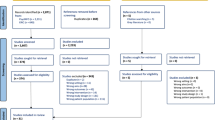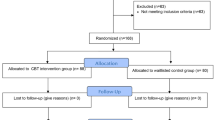Abstract
As there are internal and external demands from students to actively engage in several activities in school settings, most of them feel bored, frustrated, and nonadaptive in responding to those demands. This has increased the high prevalence of school maladjustment and academic stress in students, especially among minority groups and rural populations. Based on this, we investigated the impact of rational emotive behaviour therapy on academic stress and school adjustment among students in rural inclusive schools. This study was implemented using a pretest–posttest control group design. After obtaining permission for the study, 94 students who provided consent, participated in the study. These students were randomly assigned to two arms, treated, and assessed three times using two dependent measures. A multivariate statistic was used to test the effect of the intervention on the dependent variables. The results showed a significant effect of the rational emotive behaviour therapy (REBT) group on academic stress management among students. It also showed no significant effect of the REBT group in improving academic adjustment among students the result reveals that gender is not a significant moderator of academic stress management and school adjustment in schools and no significant interaction effect of group and gender. In conclusion, the application of REBT is useful and beneficial in managing academic stress among the rural student population and calls for advancement. Unlike academic stress, REBT does not have a significant impact in improving school adjustment among rural students.





Similar content being viewed by others
Data Availability
The data associated with this manuscript is available to the corresponding author and maybe released on a reasonable request.
References
Abdel Rahman, A. G., Al Hashim, B. N., Al Hiji, N. K., & Al-Abbad, Z. (2013). Stress among medical Saudi students at College of Medicine, King Faisal University. Journal of Preventive Medicine and Hygiene, 54(4), 195–199.
Abosi, G. (2004). The effectiveness of rational emotive therapy on achievement motivation of students. The Nigerian Journal of Guidance and Counselling, 9(1), 219–239.
Agah, J. J., Ede, M. O., Asor, L. J., & Ejionueme, L. T. (2021). Managing examination induced stress among students using FEAR-model of cognitive behavioural intervention: Policy implications for educational evaluators. Current Psychology. https://doi.org/10.1007/s12144-021-01657-z
Ageiee, J., Manzari, T. V., Hosseini, R., et al. (2012). Evaluating the effectiveness of cognitive behavior group therapy, group therapy meaning and integrating them to increase social adjustment of maladaptive students. Studty Health PSychol., 6, 6–13.
Agu, P. U., Chigbu, B. C., Ede, M. O., Okeke, C. I., Chinweuba, N. H., Amaeze, F. E., Ejionueme, L. K., Omeke, F., Aye, E., Edikpa, E. C., Onu, E. A., Nwafor, B., Ozioko, A., Mezieobi, D., Oforka, T. O., Vita-Agundu, U. C., Uwakwe, S. I., Nweze, U. N., Onah, S. O., … Ezeaku, P. (2021). Rational emotive occupational health coaching for quality of work-life among primary school administrators. Medicine, 100(29), e26541.
Ai-qiang, S., Rao, C., & Oyeesiie, R. (2014). Educational stress among Chinese adolescents: Individual, family, school and peer influences. Indian Journal of Pediatrics, 76, 495–499.
Akpene, A.Y (2014). Stress and coping strategies among supporting staff at the central administration in the University of Ghana. Retrieved from https://afribary.com/works/stress-and-coping-strategies-among-supporting-staffs-at-the-central-administration-in-the-university-of-ghana
American Psychological Association. (2013). Ethical principles of psychologists and code of conduct. In G. P. Koocher, J. C. Norcross, & B. A. Greene (Eds.), Psychologists' desk reference (3rd ed., pp. 529–550). Oxford University Press.
Anderson, J. R., Guan, Y., & Koc, Y. (2016). The academic adjustment scale: Measuring the adjustment of permanent resident or sojourner students. International Journal of Intercultural Relations, 54, 68–76.
Aneke, A. O., Ede, M. O., Agbigwe, I. B., Obumse, N. A., Nnamani, O., Ngwoke, A. N., Okenyi, E. C., Ezema, V. S., Ejiofor, J. N., Njoku, O. C., Ifelunni, C. O., Ebizie, E. N., Okpala, E., & Oneli, J. O. (2023). Examining the impact of randomized control intervention on depressive symptoms in schoolchildren with atypical behaviors. Medicine, 102(7), e32964.
Barkauskas, V. H., Lusk, S. L., & Eakin, B. L. (2005). Selecting control interventions for clinical outcome studies. Western Journal of Nursing Research, 27(3), 346–363.
Carta, M. G., Balestrieri, M., Murru, A., & Hardoy, M. C. (2009). Adjustment disorder: Epidemiology, diagnosis and treatment. Clinical Practice and Epidemiology in Mental Health: CP & EMH, 5, 15. https://doi.org/10.1186/1745-0179-5-15
Coladarci, T. (2007). Improving the yield of rural education research: An editor’s swan song. Journal of Research in Rural Education, 22(3), 22–23.
Cookey, P. U., Kennedy, M. G., Adolphus, T., & Okwelle, P. C. (2021). Effects of client-centered therapy on bullying behaviour among senior public secondary school students in Rivers State. International Academic Journal of Educational Research, 5(3), 71–84.
Cuijpers, P., Karyotaki, E., Reijnders, M., & Ebert, D. D. (2019). Was Eysenck right after all? A reassessment of the effects of psychotherapy for adult depression. Epidemiology and Psychiatric Sciences, 28(1), 21–30. https://doi.org/10.1017/S2045796018000057
Cunningham, J. A., Kypri, K., & McCambridge, J. (2013). Exploratory randomized controlled trial evaluating the impact of a waiting list control design. BMC Medical Research Methodology, 13, 150. https://doi.org/10.1186/1471-2288-13-150
Dastbaz, A., Fayyaz, E., Farshbaf, E., Alipour, M., Rostami, Z., & KhaliliKermani, F. (2014). Efficacy of narrative group therapy on the adjustment and self-efficacy of adolescent students. Advances in Environmental Biology, 8(21), 67–71.
Dawson, K. S., Bryant, R. A., Harper, M., Kuowei, T. A., Rahman, A., & Schafer, A. (2015). Problem Management Plus (PM+): A WHO transdiagnostic psychological intervention for common mental health problems. World Psychiatry, 14, 354–357.
Ede, M. O., Okeke, C. I., & Oneli, J. O. (2023). Raising the self-esteem and reducing irrational beliefs of schoolchildren: The moderating and main effect study. Medicine, 102(27), e34168.
Elliott, S. A., & Brown, J. S. L. (2002). What are we doing to waiting list controls? Behaviour Research and Therapy, 40(9), 1047–1052.
Ellis, A. (1962). Reason and emotion in psychotherapy. Lyle Stuart.
Ellis, A. (1955). Psychotherapy techniques for use with psychotics. American Journal Psychotherapy, 9, 452–476.
Ellis, A. (2001). Overcoming destructive beliefs, feelings, and behaviors: New directions for rational emotive behavior therapy. Prometheus books.
Emmanuel, O. U., & Bright-Ovie, T. P. T. I. (2015). Adjustment problem of national diploma student in Burutu environment: A case study of Delta State School of Marine Technology, Burutu Delta State. International Journal of Multidisciplinary and Current Research, 3, 489–494.
Faul, F., Erdfelder, E., Lang, A. G., & Buchner, A. (2007). G*Power 3: A flexible statistical power analysis program for the social, behavioral, and biomedical sciences. Behavior Research Methods, 39(2), 175–191. https://doi.org/10.3758/bf03193146
Fraley, T. K (2013). Homogeneity, sorting, and social capital: Differences in rural and urban school peer effects (Doctoral dissertation). Retrieved from https://uknowledge.uky.edu/cgi/viewcontent.cgi?article=1007&context=msppa_etds
França, F. D. P., & Dias, T. L. (2021). Validity and reliability of the perceptions of academic stress scale. Psicologia: Teoriae Prática, 23(1), 1–21. https://doi.org/10.5935/1980-6906/ePTPPA13041
Franken, R. (1994). Human motivation (3rd ed.). Brooks/Cole Publishing Co.
Furukawa, T. A., Noma, H., Caldwell, D. M., Honyashiki, M., Shinohara, K., Imai, H., Chen, P., Hunot, V., & Churchill, R. (2014). Waiting list may be a nocebo condition in psychotherapy trials: A contribution from network meta-analysis. Acta Psychiatrica Scandinavica, 130(3), 181–192. https://doi.org/10.1111/acps.12275
Hamidi, Y., & Eivazi, Z. (2010). The relationships among employees' job stress, job satisfaction, and the organizational performance of Hamadan urban health centers. Social Behavior and Personality: An International Journal, 38, 963–968.
Hart, T., Fann, J. R., & Novack, T. A. (2008). The dilemma of the control condition in experience-based cognitive and behavioural treatment research. Neuropsychological Rehabilitation, 18(1), 1–21.
Ikpe, I. U., Ezeonwumelu, V. U., & Okoro, C. C. (2021). Emotional intelligence and academic adjustment of second-year university students in Akwa Ibom State, Nigeria. Journal of Education, Society and Behavioural Science, 34, 21–28.
Kadapatti, M. (2017). Prevalence of academic stress among students. International Journal of Current Microbiology and Applied Sciences, 3(3), 461–463.
Nazir, T., & Özçiçek, A. (2023). Adjustment challenges and coping strategies of Arab female international university students. Frontiers in Psychology, 14, 1125368. https://doi.org/10.3389/fpsyg.2023.1125368
Nwosu, N. C., Ede, M. O., Onah, N. G., Ekwueme, H. U., Obumse, N. A., Amoke, C. V., Chukwu, C. L., Onah, S. O., Amadi, K., Ezurike, C. A., & Oneli, J. O. (2022). Cognitive behavioral therapy for challenges to quitting tobacco smoking among social science and religion students. Medicine, 101(47), e31913.
Nyamayaro, P. C. (2013). The relationship between adjustment and negative emotional states among first-year medical students. Asian Journal of Social Sciences and Humanities, 2(3), 270–278.
Obi, O. P., & Nicholas, I. J. (2020). Effect of rational emotive behaviour therapy on reduction of academic stress of undergraduate students in Rivers State, Nigeria. Journal of the Nigerian Academy of Education, 16, 293–312.
Ogakwu, N. V., Ede, M. O., Agu, P. U., Manafa, I., Ezeaku, F., Onah, S. O., Okereke, G. K. O., Omeke, F. C., Agbigwe, I. B., & Oneli, J. O. (2023a). School-based intervention for academic stress management and school adjustment among industrial technical education students: Implications for educational administrators. Medicine, 102(2), e32547.
Ogakwu, N. V., Ede, M. O., Amaeze, F. E., Manafa, I., Okeke, F. C., Omeke, F., Amadi, K., Ede, A. O., & Ekesionye, N. E. (2022). Occupational health intervention for work–life balance and burnout management among teachers in rural communities. Journal of Community Psychology. https://doi.org/10.1002/jcop.22806
Ogakwu, N. V., Ede, M. O., Manafa, I. F., Okeke, C. I., & Onah, S. O. (2023b). Quality of work life and stress management in a rural sample of primary school teachers: An intervention study. Journal of Rational-Emotive & Cognitive-Behavior Therapy. https://doi.org/10.1007/s10942-022-00494-8
Omeke, F. C., Okeke, C. I., Ede, M. O., & Oneli, J. O. (2023). Coaching impact on work-family conflict and occupational stress among educational administrators in primary schools. Medicine, 102(10), e3318.
Onwubiko, E. C (2020). Time management counseling effect on academic adjustment of low-performing student-Librarians in Nigerian Universities: An empirical study. Library Philosophy and Practice (e-journal). 4317
Rajendran, R., & Kaliappan, K. V. (1990). Efficacy of behavioural programme in managing the academic stress and improving academic performance. Journal Personal Clinical Students, 6, 193–196.
Rod, P & Haig, K (2011). Introduction to psychology. USA: Wadsworth
Shiferaw, S., Fantahun, M., & Bekele, A. (2006). Psychosocial problems among students in preparatory school, in Dessie town, north east Ethiopia. Ethiopian Journal of Health Development, 20(1), 47–55.
Sthavarmath, M. G., & Patil, M. (2021). Stress among urban and rural high school students and related factors. International Journal of Current Microbiology and Applied Sciences, 10(2), 2760–2768. https://doi.org/10.20546/ijcmas.2021.1002.305
Turner, M. J. (2016). Rational emotive behavior therapy (REBT), irrational and rational beliefs, and the mental health of Athletes. Frontiers in Psychology, 7, 1423.
Tweed, R. G., White, K., & Lehman, D. R. (2004). Culture, stress, and coping. Internally and externally-targeted control strategies of European Canadians, East Asian Canadians, and Japanese. Journal of Cross-Cultural Psychology, 35, 652–668.
Ugwuanyi, L. T., Ede, M. O., Agbigwe, I. B., et al. (2022). Effect of rational emotive behaviour therapy on depressive symptoms in a sample of parents of children with intellectual disability. Journal of Rational–emotive and Cognitive–behavior Therapy. https://doi.org/10.1007/s10942-022-00454-2
Author information
Authors and Affiliations
Corresponding author
Ethics declarations
Conflict of interest
The authors declare that they have no conflict of interest.
Additional information
Publisher's Note
Springer Nature remains neutral with regard to jurisdictional claims in published maps and institutional affiliations.
Rights and permissions
Springer Nature or its licensor (e.g. a society or other partner) holds exclusive rights to this article under a publishing agreement with the author(s) or other rightsholder(s); author self-archiving of the accepted manuscript version of this article is solely governed by the terms of such publishing agreement and applicable law.
About this article
Cite this article
Omeke, F.C., Ede, M.O., Chukwu, C.L. et al. Can REBT Reduce Academic Stress and Increase Adjustment in Rural Students?. J Rat-Emo Cognitive-Behav Ther (2024). https://doi.org/10.1007/s10942-024-00539-0
Accepted:
Published:
DOI: https://doi.org/10.1007/s10942-024-00539-0




